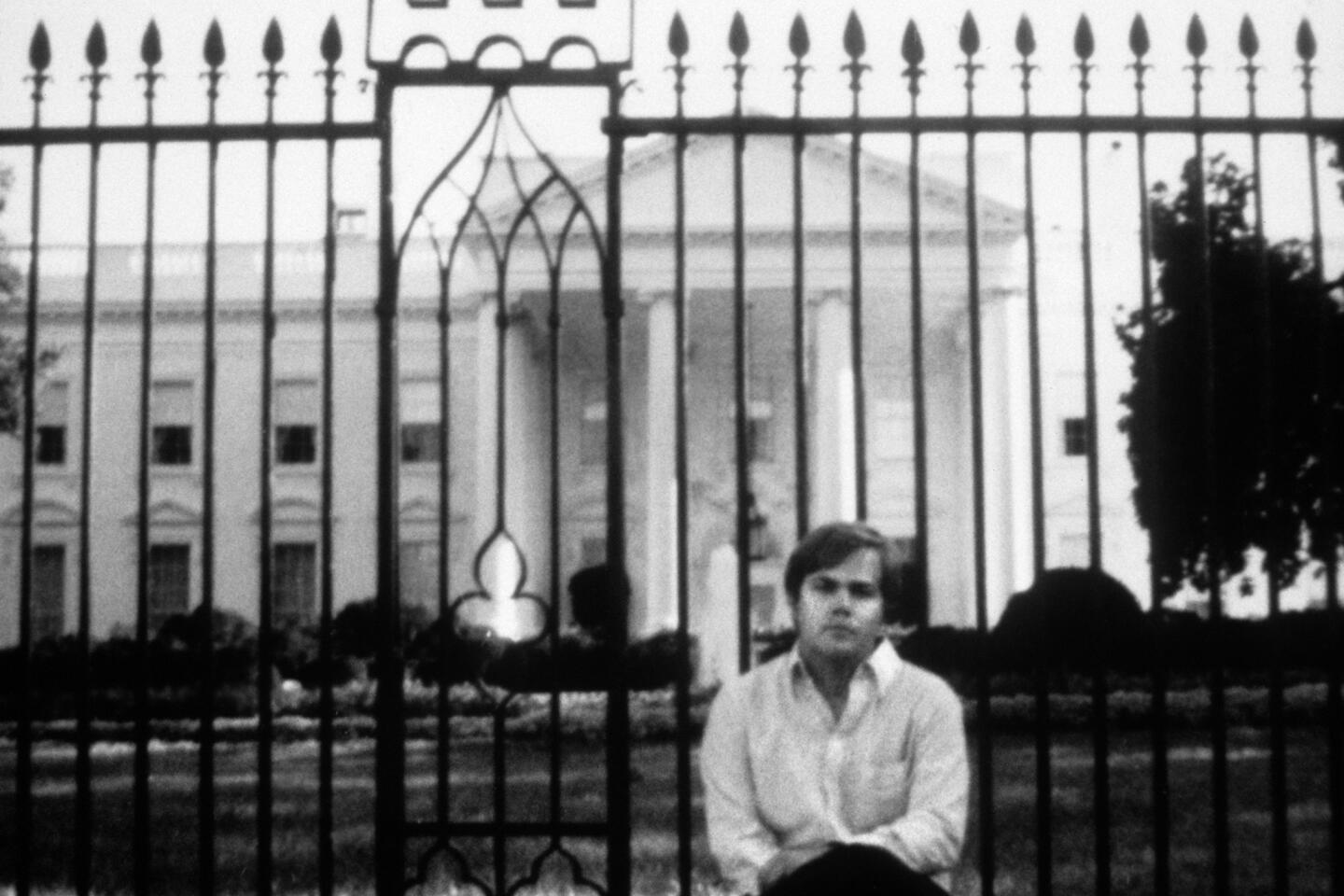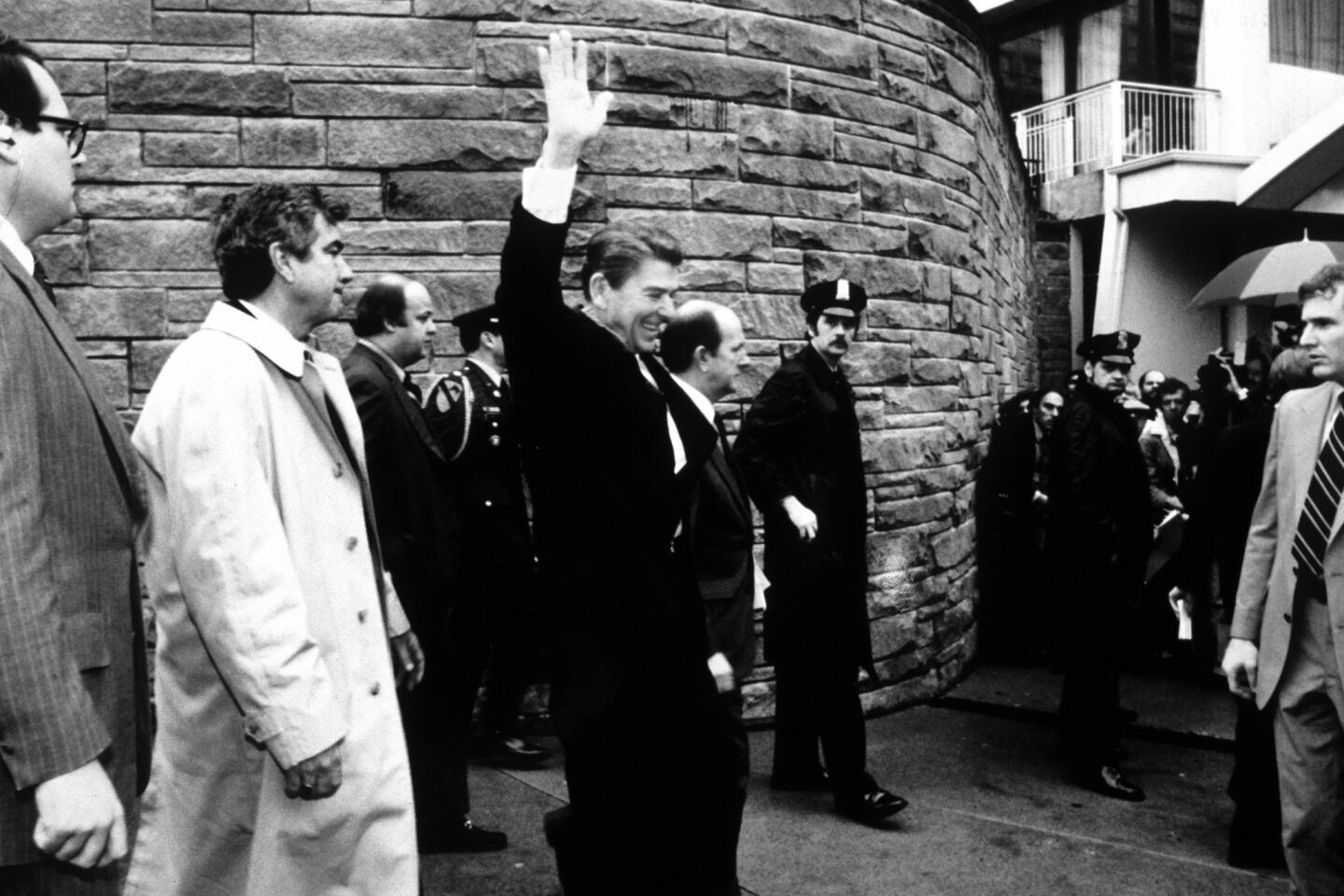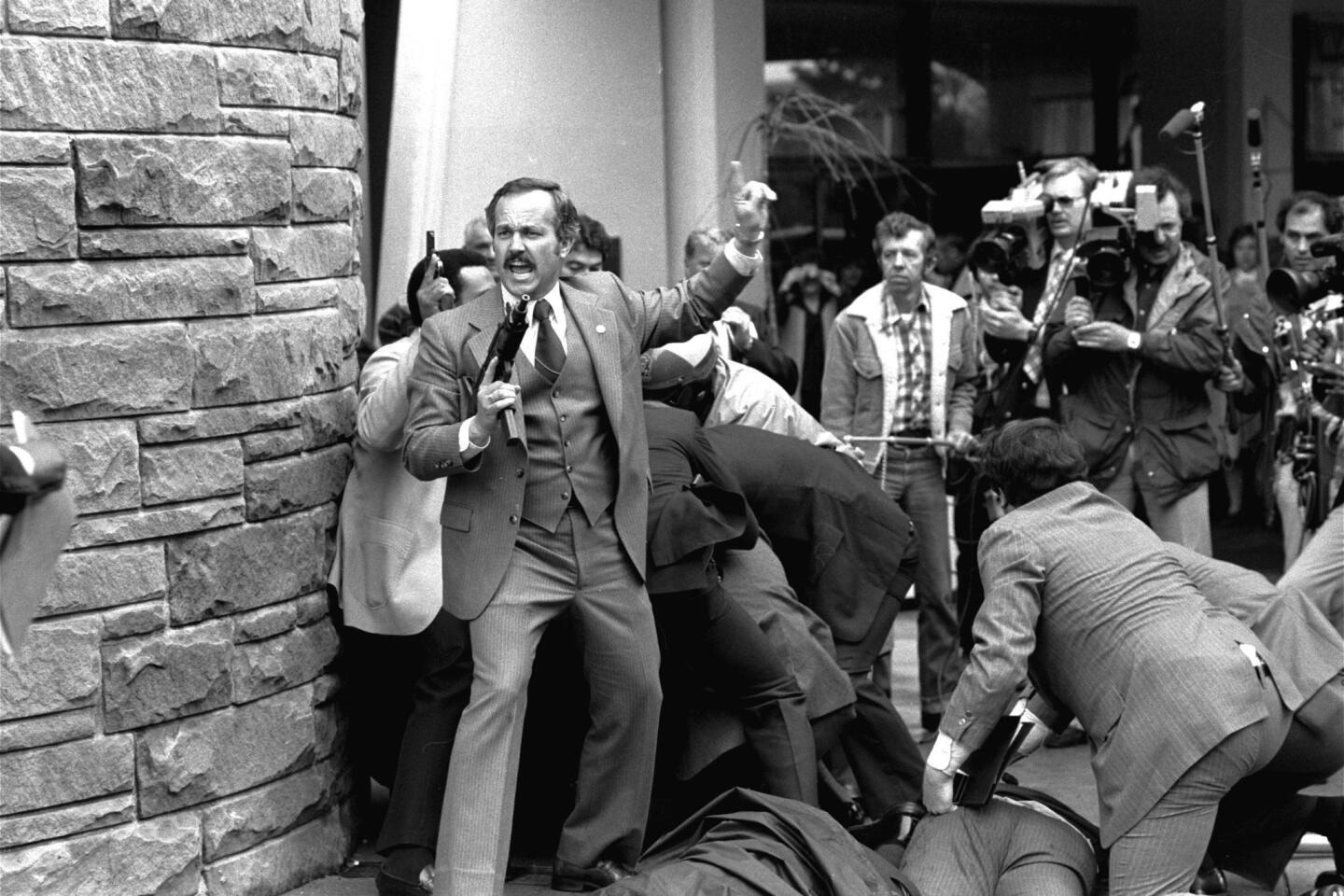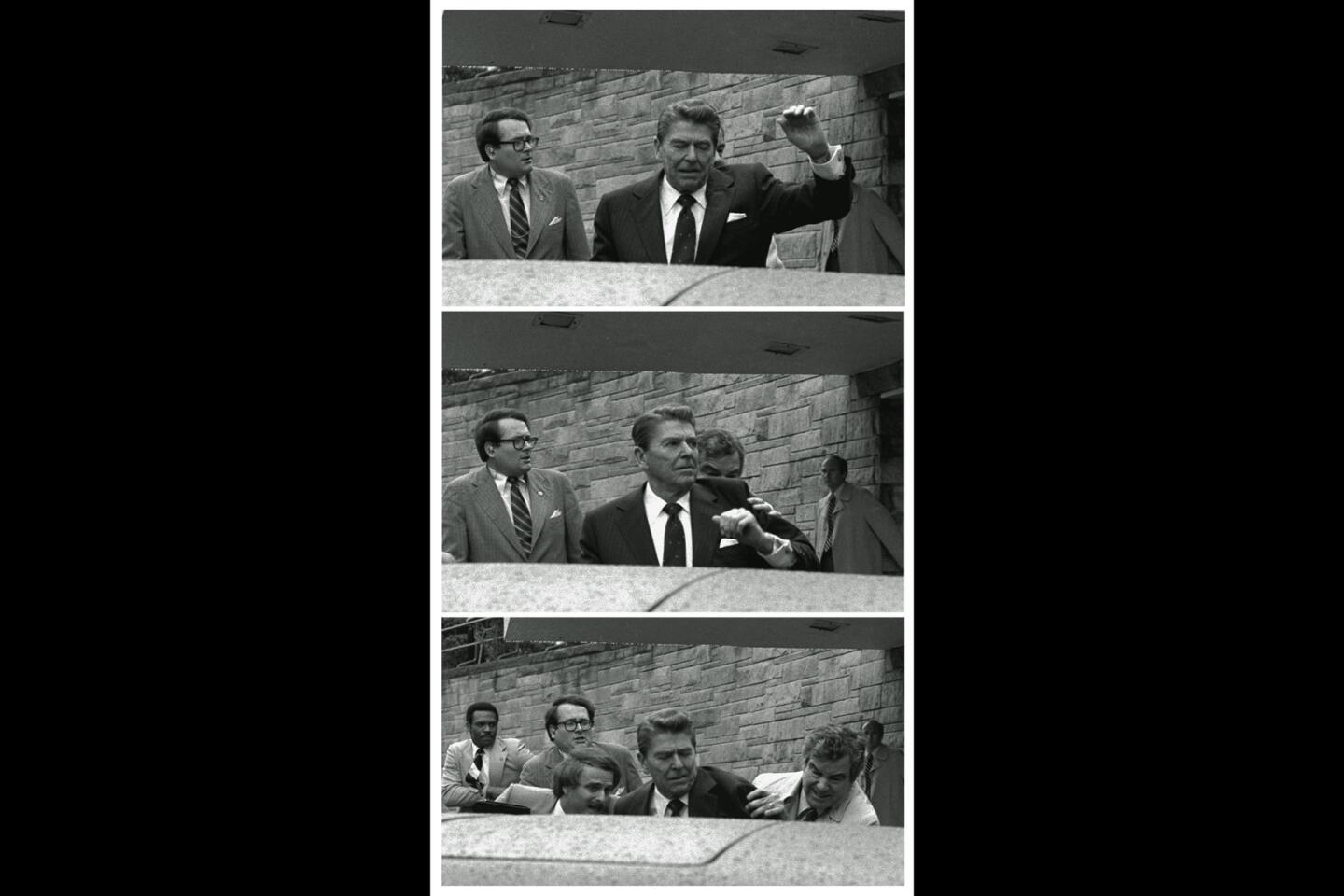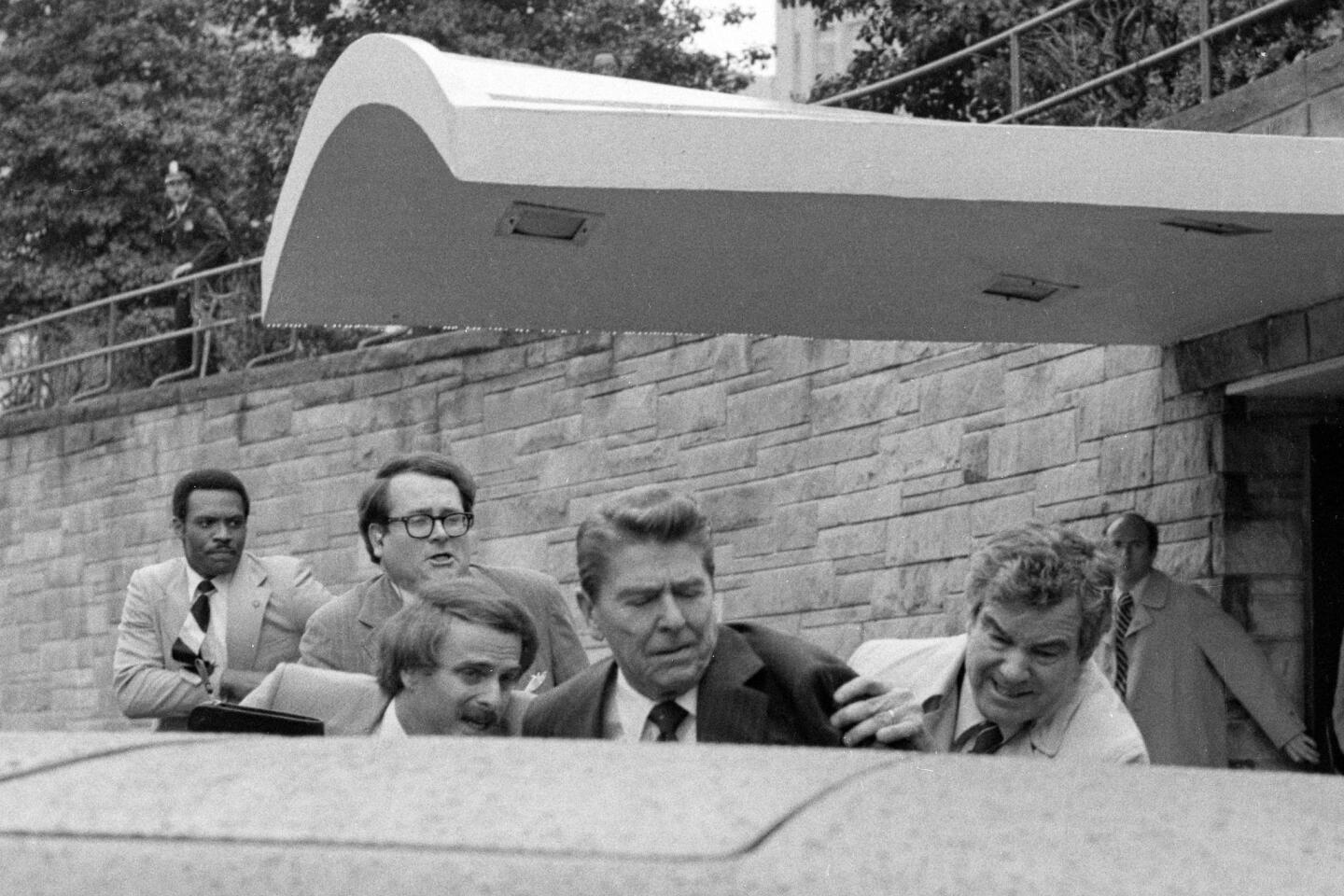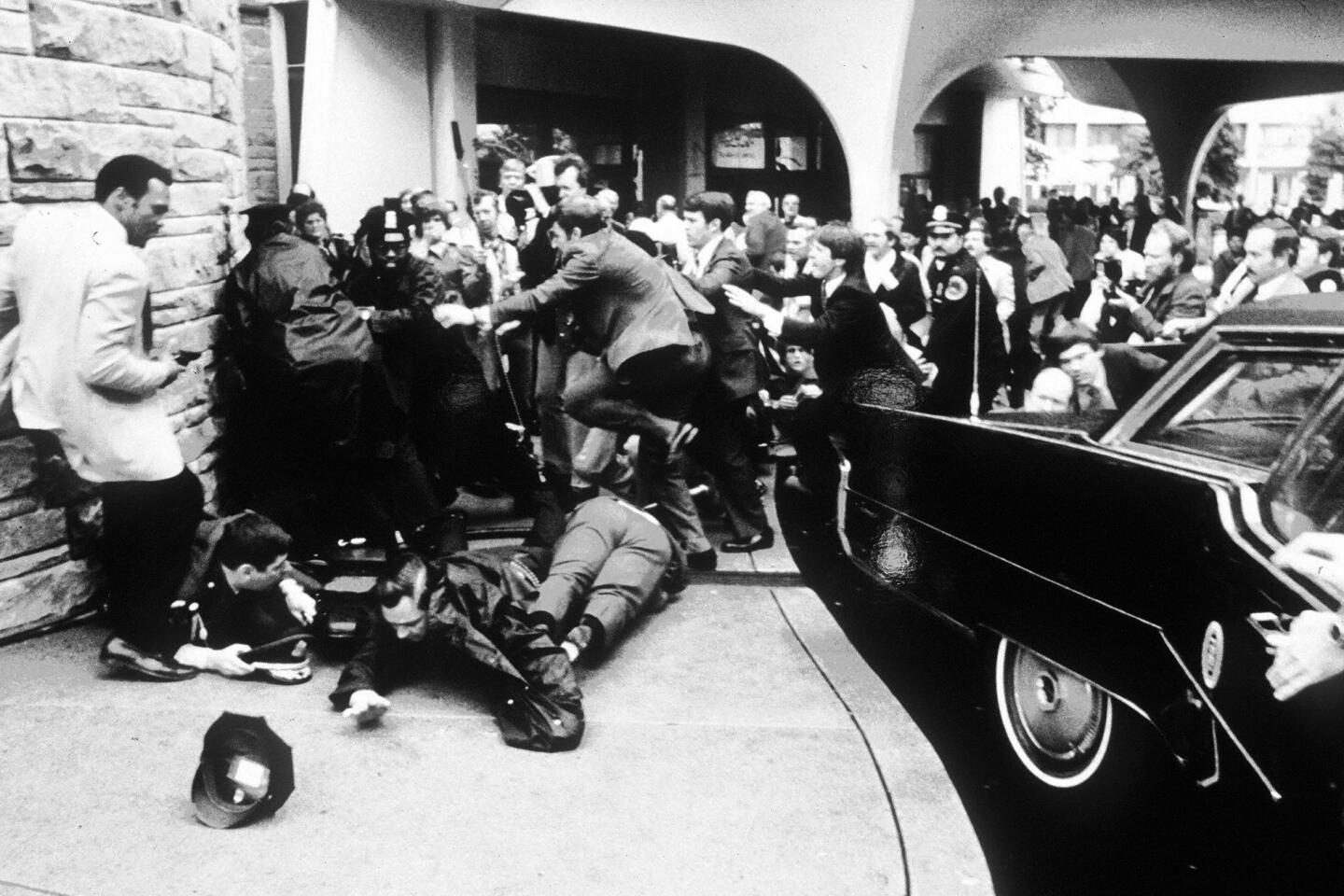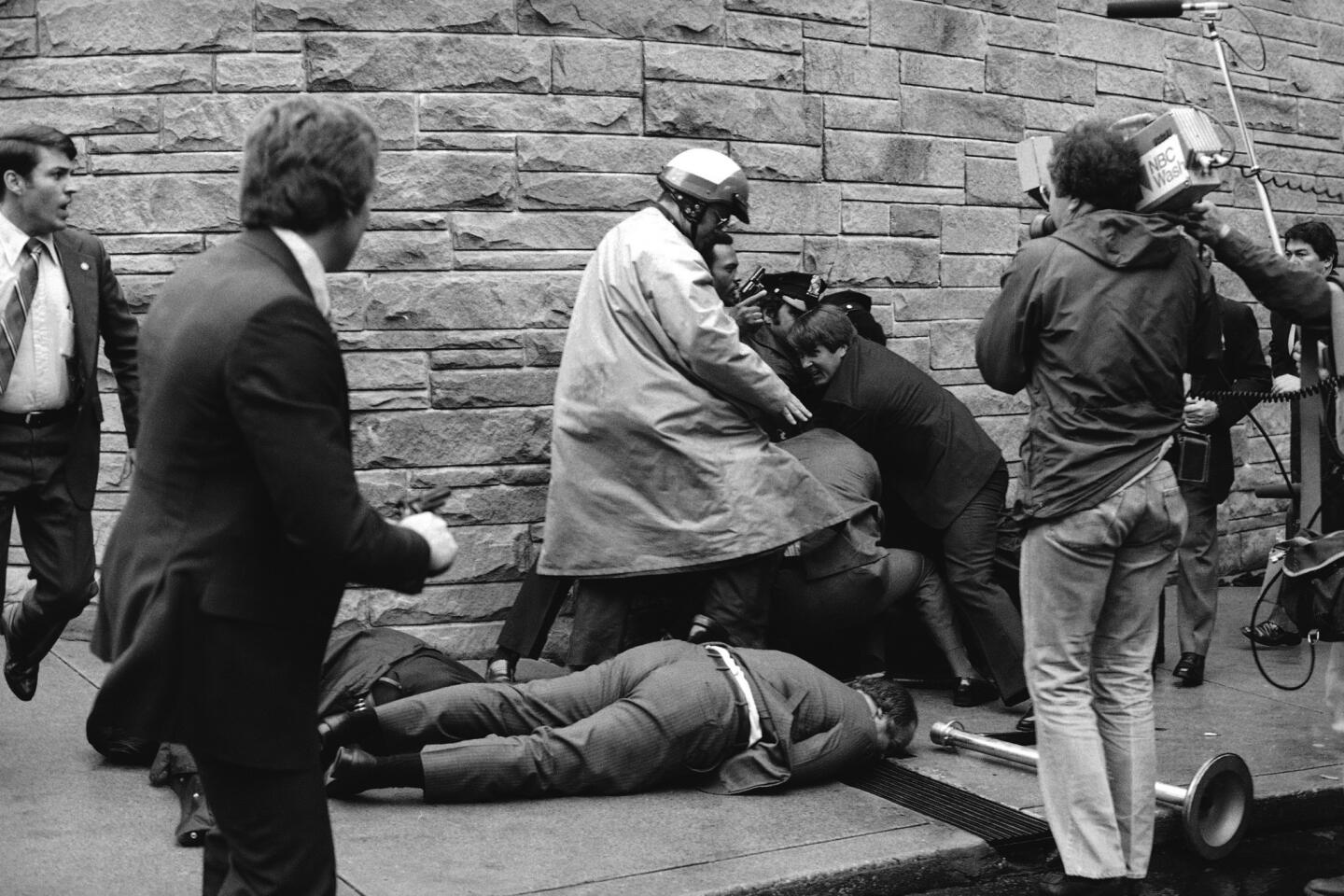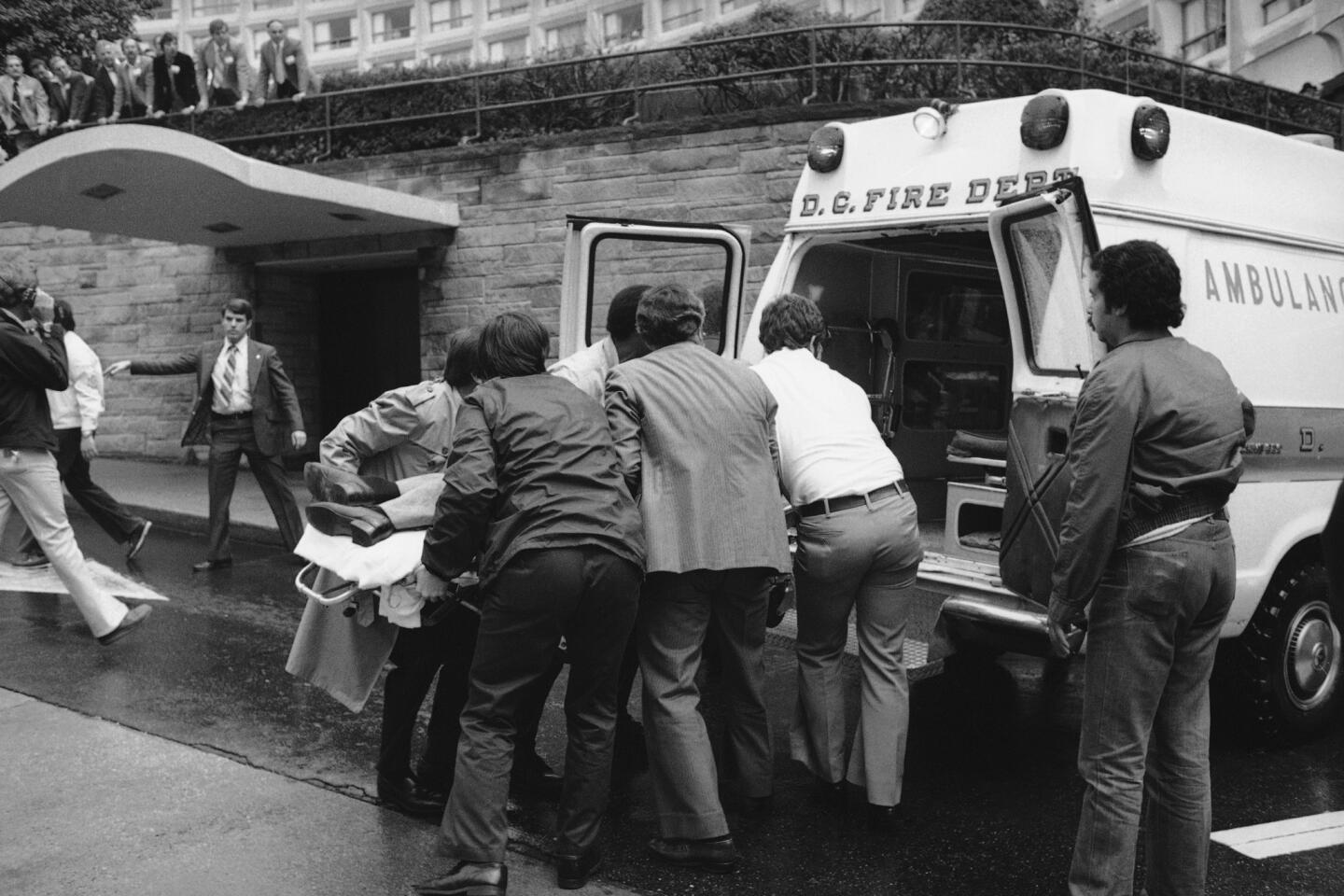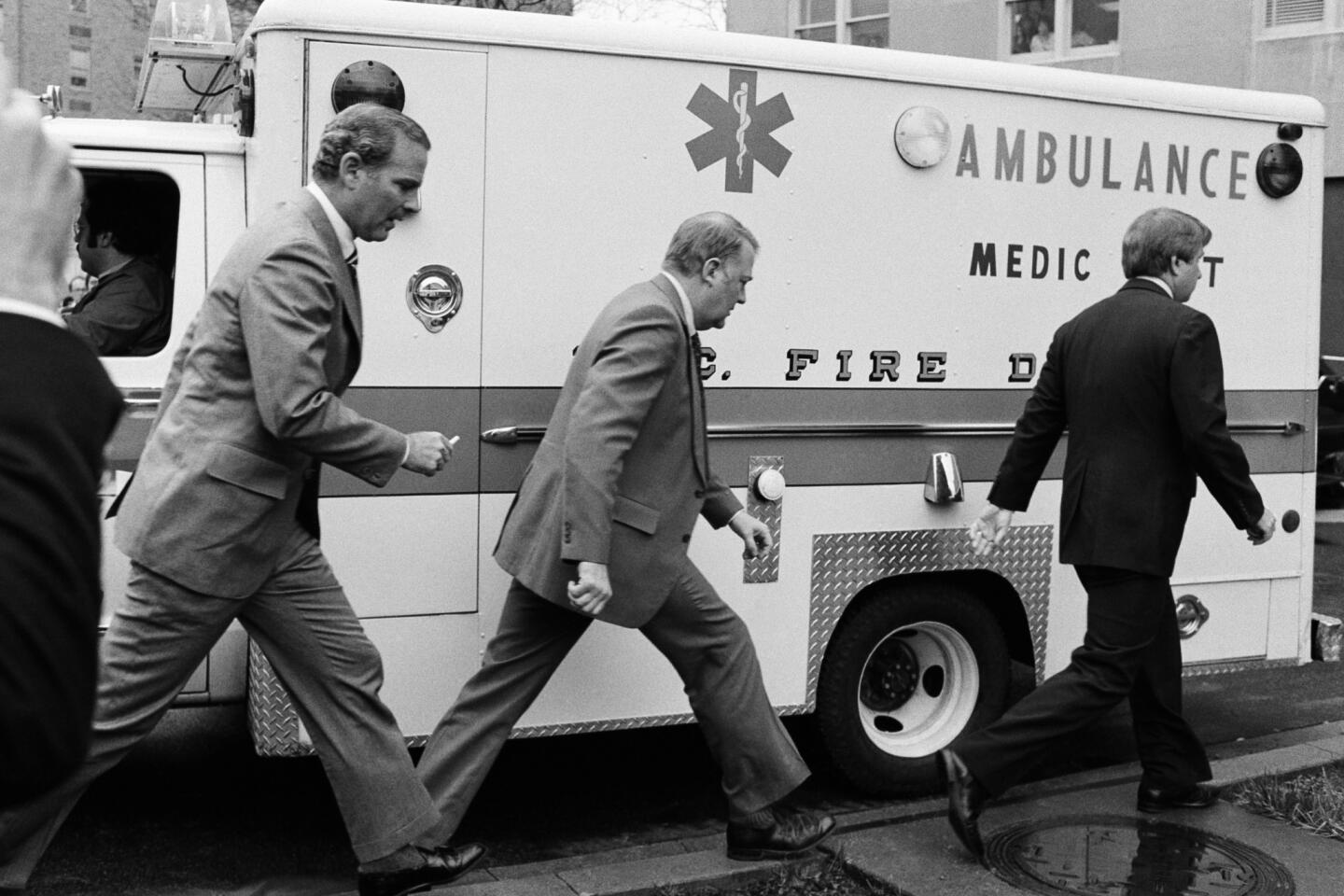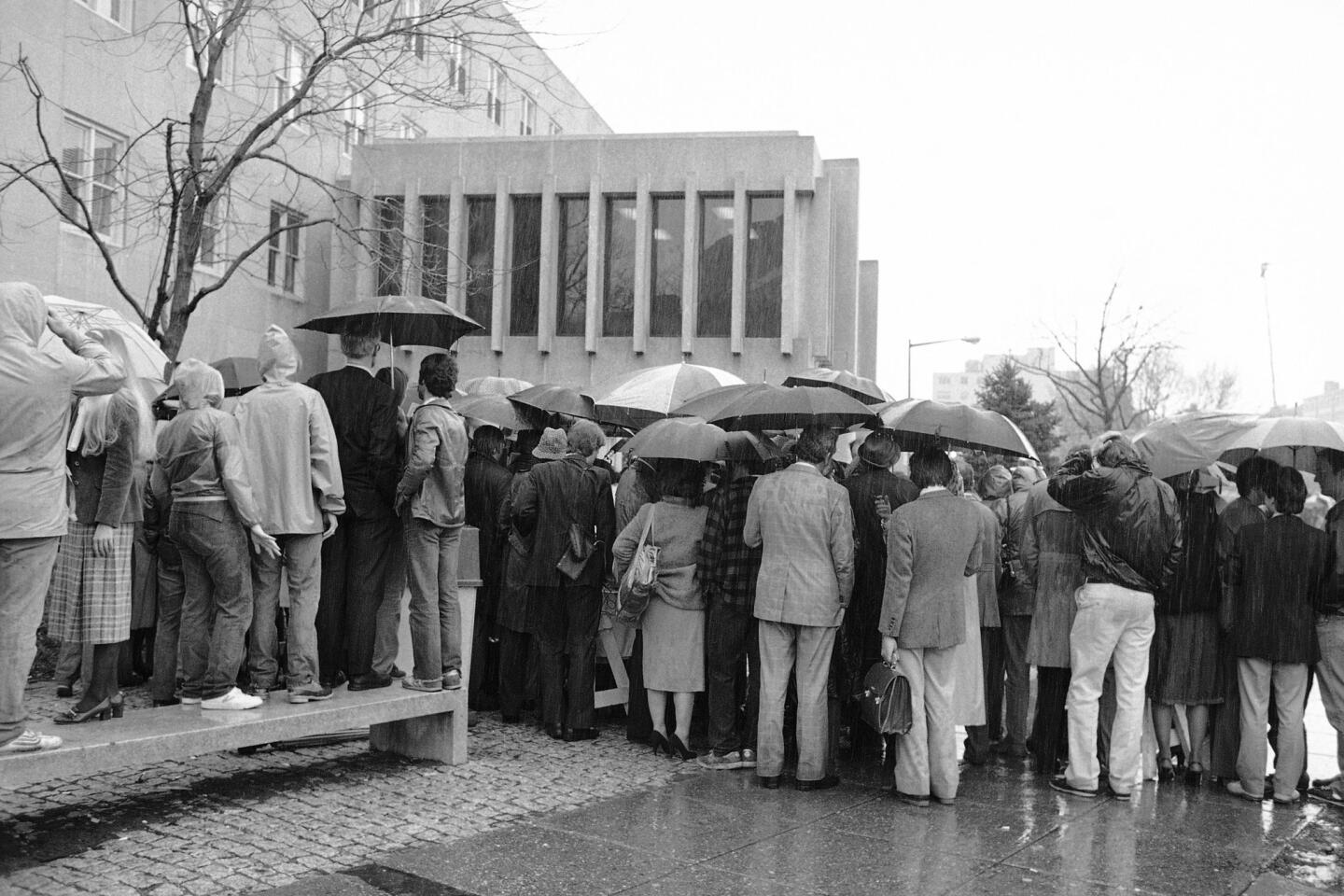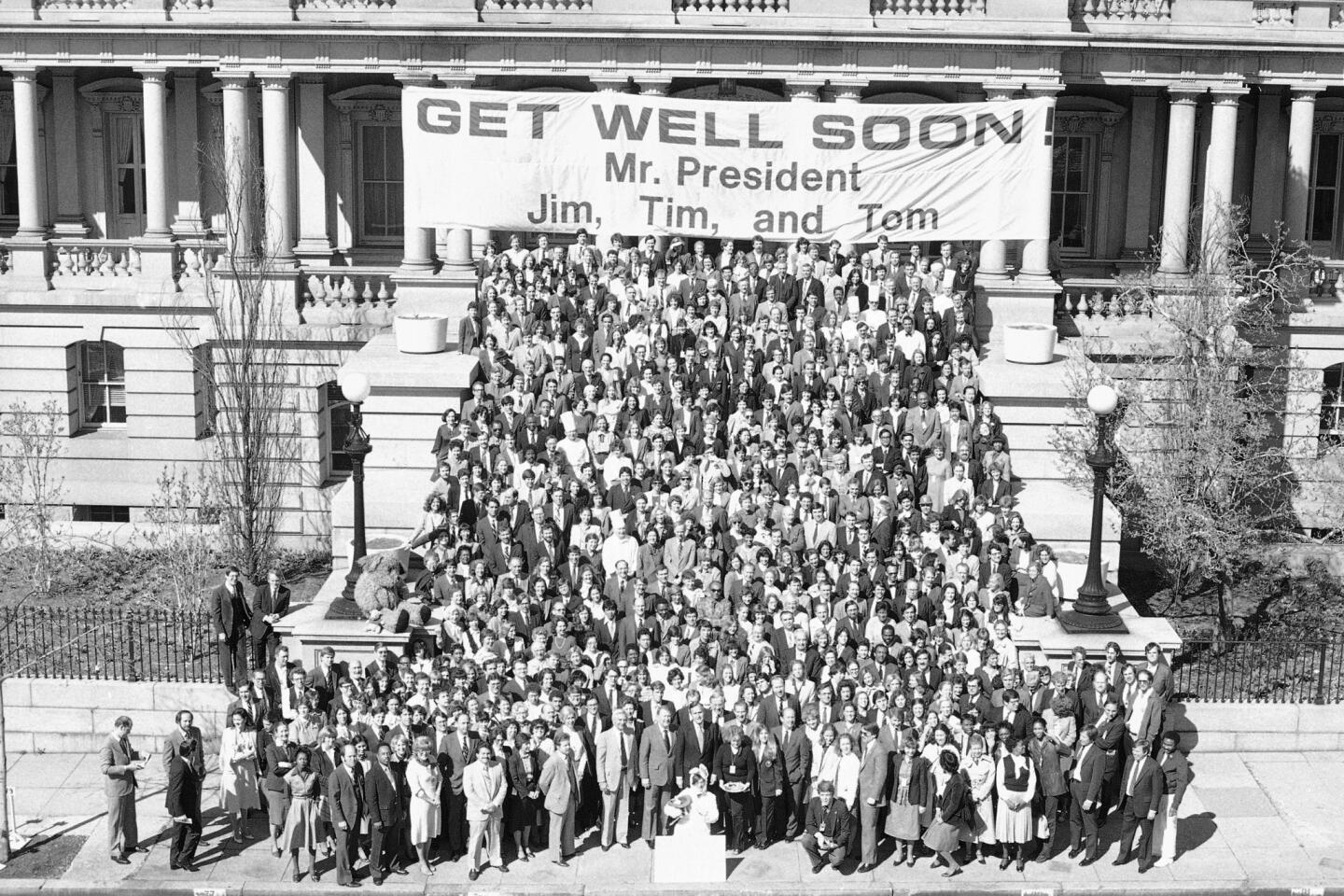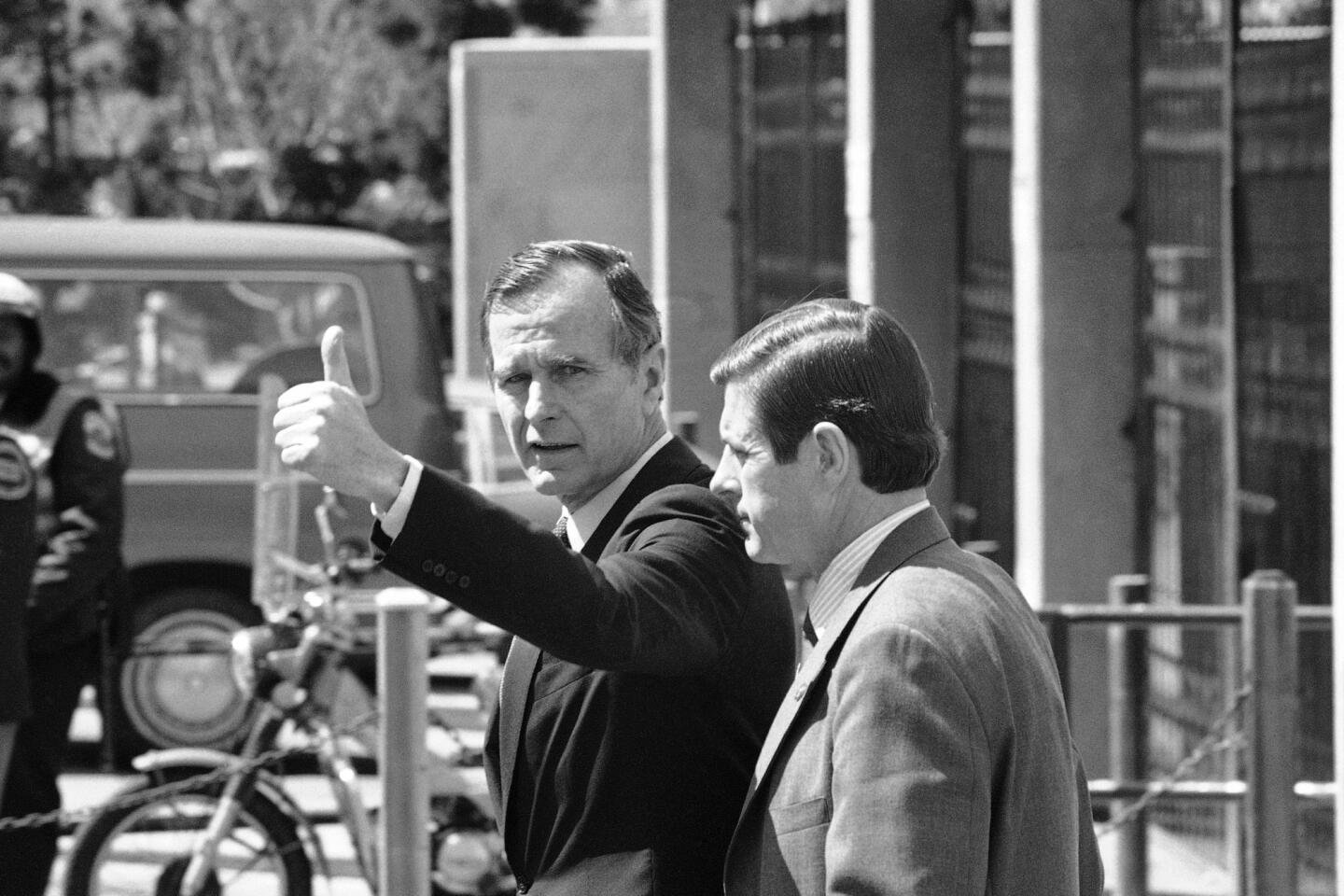How John Hinckley, Reagan’s would-be assassin, could go free
- Share via
reporting from Washington — John Hinckley Jr. is on the verge of pulling off a feat no other American has: shooting a U.S. president and going home a free man.
Hinckley, who tried to assassinate President Reagan in a bizarre attempt to impress actress Jodie Foster, is close to winning full, if conditional, release from a mental hospital. His successful insanity defense 34 years ago set the stage — and sparked a nationwide movement to rein in the legal strategy.
His road to likely freedom — something scarcely imaginable in the months after the March 30, 1981, assassination attempt — was a bumpy one, beginning with erratic behavior during his early confinement at St. Elizabeths Hospital in Washington, D.C. He penned letters to Charles Manson and Ted Bundy, and was caught keeping photos of a celebrity in his room, a violation of hospital rules and an eerie reminder of his deadly obsession with Foster.
But over time, Hinckley’s behavior improved. For the last 15 years, he has been permitted increasingly longer furloughs from St. Elizabeths. Beginning in 2013, he has spent 17 days a month at the home of his 89-year-old mother in historic Williamsburg, Va.
During those temporary periods of freedom, he has been allowed to drive to occasional jobs or visit with friends after filing strict itineraries outlining his movements. Secret Service agents often have followed him. In his spare time, he plays guitar, sings and hopes to start a band, according to court documents.
In a proceeding that began last month, St. Elizabeths and Hinckley’s family have asked a federal court here to end his confinement, arguing that there is a no longer a legal justification or medical necessity to hold the 59-year-old Hinckley.
Closing arguments are expected Tuesday. U.S. District Judge Paul L. Friedman has strongly hinted that he will order Hinckley’s release.
In the past, federal prosecutors had argued that Hinckley remained a grave threat and fought all efforts to free him. Now they are focusing instead on beefing up the restrictions and monitoring that will accompany any order to permit him to leave the hospital.
Even government witnesses have concluded that Hinckley is ready to live with his mother full time, but disputes remain over what conditions should be set.
Federal prosecutors insist that Hinckley wear a monitoring anklet to track his movements. Hinckley’s doctors say such a device is not needed and would stigmatize him.
The hospital has proposed 19 restrictions as a condition of his release, including that Hinckley stay within 50 miles of Williamsburg.
Prosecutors are pushing for 17 more, arguing that the hospital’s plan is “not feasible” and “not safe.” In addition to the anklet monitor, the government wants to require Hinckley to have weekly phone calls and monthly visits with St. Elizabeths officials.
“It is the government’s position that the hospital conditions are inadequate, lacking in structure, planning, supervision, and most importantly, lacking in risk management in order to keep the community safe,” Assistant U.S. Atty. Colleen Kennedy told Friedman last month.
The government also wants to prohibit Hinckley from having any social media accounts, including Facebook, and to limit his access to the Internet. The hospital opposes such conditions.
Government attorneys say Hinckley should be subject to greater restrictions than other patients because of the nature of his crimes. Kennedy said the conditions were justified because Hinckley had been involved in “deviant conduct” during breaks from his confinement at St. Elizabeths. As recently as 2011, Kennedy said, Hinckley lied about his whereabouts to hospital officials, saying he went to a movie but instead visiting a bookstore, where he looked at books about presidents.
Former First Lady Nancy Reagan has not voiced a public position on Hinckley’s release, a spokeswoman said. But daughter Patti Davis has questioned the reliability of assertions by Hinckley’s doctors that he has not done anything violent for the last 30 years.
“He has had a pattern of being deceptive,” she told NPR last month. “This makes no sense to me whatsoever. You know, that’s like saying there’s an expiration date on violent tendencies.”
The judge has indicated he will reject the government’s demand that Hinckley wear a tracking device, but said he would consider other ideas, including weekly meetings between Hinckley and his psychiatrist in Williamsburg, and more monitoring of his activities and relationships.
The prosecutor also said that there needs to be more financial planning for Hinckley’s care and support after his mother dies. The government noted that the family currently pays $5,000 to $10,000 a month in psychiatric bills.
A final decision on any release and restrictions is not expected for several weeks.
Eventually, however, Hinckley is likely to be living with his mother at the Kingsmill Resort, a gated golf community on the James River southeast of Richmond, Va.
Jack Garrow, a retired naval admiral who lives a few doors down from Jo Ann Hinckley, is unsure how he feels about his soon-to-be neighbor. “His life has caused so much heartache for people I have admired and respected,” he said.
Garrow noted that Hinckley also shot Press Secretary James Brady, who suffered brain damage as a result. Brady died last August. A policeman and a Secret Service agent also were injured.
“I don’t have a lot of good feelings toward him, but I do have good feelings toward the family,” Garrow said. “If it is decided he is not a threat and it makes Mrs. Hinckley happy in her old age, so be it.”
Hinckley, the son of an oil company executive, grew up in Texas, where he was athletic, musical and popular in school. After attending college there on and off, he moved to Los Angeles, hoping to become a songwriter. When that did not work out, he moved back in with his parents, who were then living in Colorado. He began buying weapons and showing early signs of mental illness.
He became obsessed with the 1976 film “Taxi Driver,” about a man who plots to kill a president, and with the teenaged Foster, who played a prostitute in the film. He stalked her in college at Yale, sending her love notes. When she did not reciprocate his interest, he turned to the idea of assassinating a president to impress her.
Hinckley stalked President Carter before focusing on Reagan after he took office in January 1981. He shot Reagan two months later as the president left the Washington Hilton Hotel after a speech.
When a jury found Hinckley not guilty by reason of insanity in 1982, it provoked Congress and many states to tighten laws on using insanity as a defense. But experts said the legislation did little to change its use, in part because such defenses are rarely invoked and seldom successful.
“Basically, the laws had very little impact,” said Henry J. Steadman, president of a private research organization in New York that studies health and criminal justice, and author of a book about Hinckley’s effect on the insanity defense. Defense lawyers shifted their tactics toward arguing their clients were incompetent to stand trial, he said.
Paul Appelbaum, a professor of psychiatry at Columbia University, said that among the reforms made after the Hinckley case were measures to tighten controls on the conditions of release when the criminally insane are sent back into society. Hinckley will now be subject to those measures.
One other would-be presidential assassin has been set free: Lynette “Squeaky” Fromme, who tried to shoot President Ford in 1975. Ford was unhurt.
More to Read
Sign up for Essential California
The most important California stories and recommendations in your inbox every morning.
You may occasionally receive promotional content from the Los Angeles Times.
